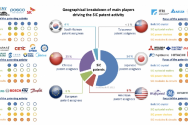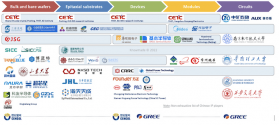The United States can't block the acceleration of domestic substitution of equipment and materials
According to Weibo news, recently, the United States has reported that new sanctions are being brewed against the key equipment required by mainland chip foundries. Such rumors are enough to show the key significance of equipment materials to a country's semiconductor industry.
In the first ten days of May, mainland listed companies in the field of semiconductor equipment and materials have successively released their first-quarter financial reports, providing valuable information for the outside world to grasp the development of domestic industries.
Performance growth shows resilience
The 24 listed semiconductor equipment and materials companies (9 equipment and 15 materials) tracked by Aijiwei will achieve a total operating income of about 60.2 billion yuan in 2021, with an average year-on-year revenue growth rate of 65.28%, except for 3 companies. Outside the enterprise, the net profit attributable to the parent company recorded a year-on-year increase.
Such a strong performance will continue in the first quarter of 2022. The average revenue growth rate of 24 companies in the current quarter is 55.35%, and the performance is still quite resilient.
New containment, new impetus
In addition to the epidemic in Shanghai, the unexpected factors worthy of attention in the equipment and materials industry in the second quarter are the new measures of potential "containment" of the mainland semiconductor industry by the United States.
According to U.S. media reports this month, the U.S. Department of Commerce is considering drafting new restrictions on the export of advanced chip manufacturing equipment to the mainland. The targets are said to include not only several domestic foundry and IDM giants, but also overseas manufacturers in China. Production facilities. In line with such rumors, the US think tank "Center for Security and Emerging Technology" (CSET) also released a report recently, and even made no secret that "export control of advanced semiconductor manufacturing equipment is the most important tool for China to continue to be dependent on chips abroad." .
Obviously, the United States is trying to maximize its dominant position in the field of semiconductor equipment and turn it into a "weapon" to contain and curb the development of mainland industries, and such operations will only further increase the urgency of domestic substitution of mainland semiconductor equipment materials. This will greatly benefit the development of the domestic equipment and materials industry and bring new growth momentum to it.
Judging from the information released in the annual reports of relevant companies, domestic manufacturers are also rapidly promoting product upgrades, aiming at 14-28 nanometers and even more advanced process nodes to develop supporting equipment and materials.
For example, in the field of equipment, the ICP etching machine project of Zhongwei Company for 3-5 nanometer node logic chip manufacturing has successfully developed 5 nanometer etching equipment, completed the evaluation in advanced logic chip manufacturers and achieved sales, 3 nanometers The design, manufacture, testing and preliminary process development and evaluation of the etching machine Alpha prototype have also been completed; another semiconductor equipment giant in Shanghai, Shengmei, has also completed the double Damascus electroplating process 14nm variable speed water process development, and through customer DEMO Get verified and match the BSL data of the production line. ECP electrochemical electroplating technology has completed the 28nm process verification and entered the mass production stage of the production line. The 14nm and below processes are undergoing process verification. The relevant front-end electroplating equipment can be applied to products such as FinFET, DRAM and 3D NAND with 3D structure, as well as new nano-devices in the future. Interconnects with metal wires such as quantum devices.
In the field of materials, NTU Optoelectronics has made breakthroughs in the industrialization of ArF photoresist, and has passed the customer certification of a memory chip manufacturing company and a logic chip manufacturing company respectively, and is stepping up efforts to tackle and industrialize 28nm and 14nm advanced process precursors; Shanghai Silicon Industrial 300mm semiconductor silicon wafers have successfully passed the technical certification of 14nm logic products, realizing the batch supply of 300mm semiconductor silicon wafers for 14nm process node applications. The company also participated in an equity investment in Guangzhou Xinrui Photomask Technology Co., Ltd. in 2021, which will build an advanced photomask production line for 40-28nm and above processes, further ensuring the information of integrated circuit chip design for domestic enterprises Safety.
The breakthrough in technical capabilities has also enabled domestic companies to repeatedly win orders in the public bidding for domestic wafer equipment in recent years. The company has a large order of 12 etching machines, including passivation film plasma etching machine, oxide film plasma etching machine and silicon nitride plasma etching machine.
It is worth mentioning that the domestic replacement of the most "eye-catching" lithography machine in chip manufacturing equipment is also steadily advancing. Judging from the bidding information, Beijing Guowang Optical Technology Co., Ltd., which is 66.6% owned by Yizhuang SDIC, has been Started the tender for CNC machining equipment for the R&D and production base. It is expected to be officially completed and put into operation in 2023. The company's basic positioning is to establish my country's own technology research and development and production system for the ultra-precision optical industry, and fundamentally solve the problem of exposure optics for my country's IC manufacturing projection lithography machine. Industrialization of systems and high-end precision optical equipment. The R&D and production base under construction is located in Beijing Economic and Technological Development Zone. After completion, it will have 350/280nm nodes, 90/110nm nodes, 28nm and below nodes for extremely large-scale IC manufacturing projection lithography machine exposure optical system products R&D, design and batch production Production supply capacity.
In addition, domestic substitution of equipment and materials, in addition to technical research and development barriers, also faces the test of import verification by downstream customers. The verification cycle of ten to twenty months means huge time and financial costs for domestic manufacturers. Shanghai Integrated Circuit Research and Development Center Co., Ltd. (ICRD), a subsidiary of Shanghai Hua Hong, has built a pilot line for 12-inch integrated circuit advanced process research and development and domestic equipment and material evaluation and verification, providing public equipment and materials for the construction of an independent and controllable industrial chain. Validation platform. According to public information, since 2015, the platform has provided 20 domestic equipment such as 90nm ArF lithography machine and 14nm silicon etching machine, and more than 10 domestically produced equipment such as ArF photoresist, copper polishing solution, copper plating solution and additives. The materials provide test verification and supporting process development, and more than half of them have been verified and entered into large production lines for mass production applications.
It is not difficult to see that the potential US semiconductor equipment "containment" measures will more likely accelerate rather than slow down the pace of domestic substitution in my country's semiconductor equipment and materials industry, bringing new favorable boosts to relevant listed companies.
American politicians have delivered what the Chinese government has dreamed of for decades. If the plan was to make sure that the Chinese military did not have access to advanced micro-nano manufacturing techniques or access to advanced chips then I have bad news for them now that the Chinese military will have the ability to manufacture more advanced micro-nano technology products, such as advance semiconductors, photonics, AI and Quantum, etc. without any scrutiny at all.
The meeting ended without an immediate resolution, and that left hawks in Washington dissatisfied. “No update to the SMIC licensing policy is a major mistake,’’ Michael McCaul, the lead Republican of the U.S. House Foreign Affairs Committee, said in a statement. “We cannot let the interests of one industry segment result in the Chinese military being able to make its own semiconductors.”
Executives from the U.S. companies argue that it would be safer to install their equipment in Chinese factories because the software could allow them to monitor what the chipmakers are doing. Otherwise, those facilities become a black box, they said, asking not to be identified discussing matters of national security.







